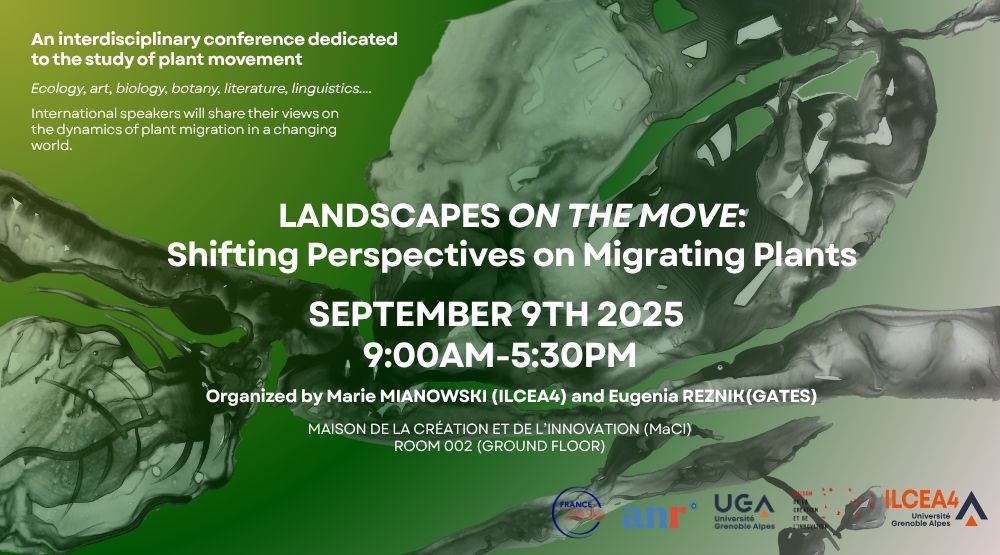- Imprimer
- Partager
- Partager sur Facebook
- Partager sur X
- Partager sur LinkedIn
GATES, Journée d'étude / Recherche
Le 9 septembre 2025

An interdisciplinary conference dedicated to the study of plant movement, organized by Marie Mianowski (ILCEA4) and Eugenia Reznik (GATES).
Let us pause for a while. Let us drop our hiking poles, our heavy backpacks and our gloves for a moment. Down on our knees, or even lying flat on our bellies against the earth, let us stay still and immobile like this plant here, before us. Like this plant? What if, on the contrary, this plant had something to tell us about mobility? Where does it come from? How long has it been growing here? How long is it going to be here for?
The current renewed interest for the issue of migration in art and science – as is shown in the ongoing exhibitions ‘Migrations, a Human Odyssey’ at the Musée de l’Homme, ‘Migrations of the Living World’ at the Muséum de Bordeaux, or ‘Exile’ at the Louvre-Lens, is an invitation to shift our perspectives. In this conference we wish to explore how the mobility of plants is represented in literature, visual arts, music, botany, biology and human sciences. If the mobility of plants has often run parallel to that of human beings, it raises new questions today because of the speed of migratory journeys, the globalization of exchanges, as well as of new regulations. Nowadays, what does it mean to be living in constantly morphing landscapes? How can we look with sensitivity and a renewed gaze at the ever-changing more-than-human world?
During this conference we wish to explore two main avenues. We wish first to try and de-center our gaze and look at the more-than-human world from the perspective of the more-than-human (Estelle Zhong-Mengual and Baptiste Morizot). Plants can be uprooted, displaced and replanted. To what extent can we attempt to grasp those displacements from the perspective of plants? Thus doing, what other types of displacements are triggered? What relationships are woven between plants and their new milieu? What agential shifts are at play for the human observer? What new narratives can we invent to tell those journeys? What does this change of viewpoints entail from an anthropological, philosophical or artistic perspective?
Our aim is to question the shifts created when the mobility of plants is viewed from the perspective of plants; when we try to de-centre ourselves from our human gaze. We wish to reflect upon this aspiration at de-centering ourselves and what it means in terms of change, as well as what new grounds of exploration it clears, in order to understand the more-than-humans and the relationships between humans and the more-than-humans. This reflection will be based scientifically from the perspective of plants (biology, botany, agro-forestry), as well as from the perspective of philosophy and anthropology. Any attempt at representation implies anchoring oneself in the present moment before reaching out to abstraction and imagination. Is it at all possible to escape our point of view as human beings when contemplating the more-than-human world, and in particular plants? Shouldn’t we focus our attention on other types of displacements rather than on the fundamentally inadequate and illusory shift of our human attention, hoping to be able to gaze at the world from the perspective of plants? This intentional shift induces a necessary reflection on relational ethics, on the adequate distance towards other human beings and the more-than-human world, in order for us, humans, to better understand and better adjust ourselves to the world in which we live. What does this intentional shift also tell about the necessity for human beings to reconnect the link between ecology and the sublime, as Mathilde Ramadier writes in Renouer avec la terre, plaidoyer pour un nouveau sublime1 (Seuil, 2025)?
The second avenue we would like to investigate concerns practice-based research. How can artistic practice, and more precisely practice-based research, address and represent the intentional displacement described above, a relationship with plants which would aim at giving them pride of place, while paradoxically being detached from the human gaze actually representing them? What is the impact of plant migration on practice-based research? In juxtaposing scientific talks and artistic performances, in interlacing the voices of researchers and artists, is it possible to create new patterns of representation of mobile landscapes?
The conference organized on 9 Septembre 2025 will be part of an exhibition entitled ‘Plants on the Move’ organized at la Maison de la Création et de l’Innovation on the campus of Université Grenoble Alpes. It will give us the opportunity to exhibit visual art and videos by artists from Grenoble and beyond who, drawing their inspiration from botany, biology and human sciences have imagined new botanical narratives of plants on the move, hybrid landscapes and identities as well as new relationships between human beings and plants.
Eugenia Reznik is a Ukrainian-French-Canadian visual artist who resides and practices her art in both Canada and France. She holds a Master’s degree in Applied Mathematics from the University of Kiev and a Master’s degree in Visual and Media Arts from the University of Quebec in Montreal, where she also defended her PhD in 2023.
Marie Mianowski is professor of anglophone literatures at Université Grenoble Alpes and Director of ILCEA4
Supported by the GATES project (Grenoble ATtractiveness and ExcellenceS), funded by the French government's Programme d'Investissement Avenir and implemented by ANR France 2030
Date
9:00 AM - 5:30 PM
Localisation
Maison de la Création et de l'Innovation
339 avenue Centrale, St Martin d'Hères
Room 002, ground floor
- Imprimer
- Partager
- Partager sur Facebook
- Partager sur X
- Partager sur LinkedIn
